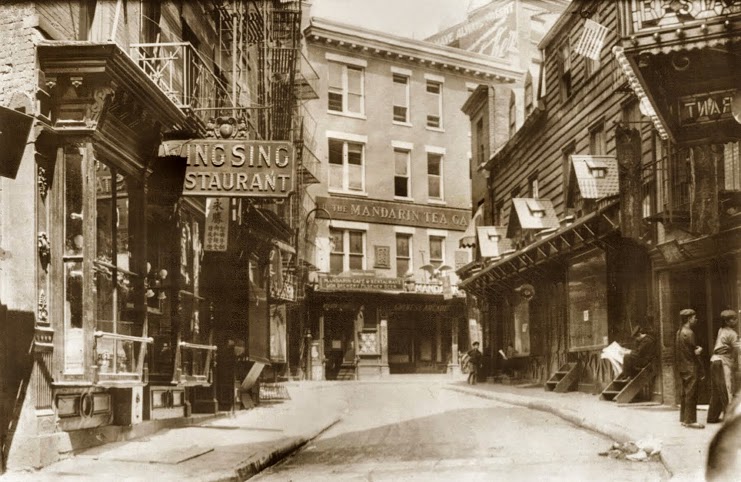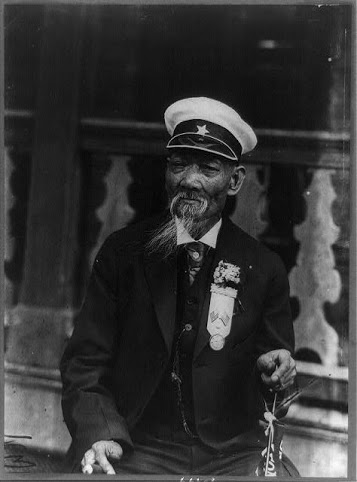School For Scoundrels
The thunder of traffic cascades from above, bouncing off the concrete confines of the passive Manhattan Bridge pylons. The rattle of a subway train trundling across the tracks adds to the cacophony raining down on the otherwise silent, deserted street piled high with the refuse of a day's business. Lighted signs still flicker, giving some semblance of life to the place, but it is an illusion. Chinatown east of the Bowery is a bustling neighborhood by day. At night, however, it slumbers. What action there is moves into the shadows, the back rooms, the unmarked doors. It's conducted quietly, furtively, and does not invite you in. If you are welcome, you already know it, and you already know where to go.
The entrance to 88 Palace certainly isn't an unmarked door. It's one of Chinatown's busiest dim sum restaurants, and during the day it booms with the sound of that grand tradition.But tonight something's different, as witnessed by the elegantly attired woman lingering out front in a long black cocktail dress. With a knowing nod, she sends you to the door behind her, usually locked at this hour. Inside it is dark, as it should be, but the noise that hits you as you walk through the door tells a different story. It flows down the grand staircase as you ascend like Chow Yun Fat walking the hallway of the Fung Lim Restaurant, planting guns and caressing a lady while Chen Xiao-yun sings in the background. Laughter. Music. The distinct sound of a roulette wheel. The unmistakable siren song of a cocktail shaker. At the top of the stairs, burlesque performer Minx Arcana, wearing a pink corset and fishnets, welcomes you to Atlas Obscura's Cheaters Party: A School for Scoundrels.
It's all make-believe, of course, but isn't that the case with many of the best things in life?
This Wolfish Den
New York's Chinatown hasn't always been Chinatown. For much of the 1800's it was Five Points, one of the world's most infamous, most dangerous, most compactly populated slums, a place Charles Dickens once described as "this wolfish den." What had once been a verdant, bustling district centered around Collect Pond near Bowery Street -- for a long time the city's sole source of fresh water -- became increasingly polluted and filthy. When the decision was made to fill in the fetid body of water, what businesses remained moved elsewhere. The fill didn't work very well, resulting in a stinking, swampy mess that chased away anyone who could afford to leave. For the most part, that left poor Irish immigrants. Centered around what would become Columbus Park, the Five Points neighborhood rapidly grew into America's most dangerous neighborhood and gave rise to New York's most notorious gangs.
Toward the end of the 19th century, Chinese immigrants began to settle on the outskirts of Five Points. These were men -- always men; the US did not allow Chinese women into the country -- who had come looking for a better life, usually chasing jobs on the railroad, and found the American dream wanting. As the irish moved out of Five Points, the Chinese moved in. By the turn of the century, Chinatown was born. While the city and the new residents did everything they could to scour the stain of Five Points away, the Chinese brought with them their own criminals and vices, just like everyone else. And their own gangs in the form of Tongs, American offshoots of the Triad societies back in Hong Kong and China. In 1900, war broke out between the established On Leong Tong, led by a guy named Tom Lee, and the upstart Hip Sing led by recent arrival Sai Wing Mock, alias Mock Duck, who conducted himself with the ruthless bravado and unrepentant swagger of a movie gangster, "strutting around on Pell Street, covered in diamonds," as one historian described him. This tong war was complicated by the fact that both gangs had their headquarters on Doyers Street, just a couple doors away from each other. Outside their headquarters, in barber shops (why do gangsters ever go to barber shops???), and in front of the Chinese Opera House, the opposing tongs would go at each other with hatchets and, when they could get them, guns. The frequent clashes and assassinations that occurred on that narrow, curved street earned it the nickname The Bloody Elbow Angle.
Vice City
Of the many vices that became synonymous with Chinatown, none was more sensational than opium. Ironically, though, there were far more opium dens outside of Chinatown than within, and the prefered Chinatown vice was gambling. Still is, mostly in the form of clandestine mahjong games (fantan having fallen out of favor). Tom Lee and Mock Duck both ran gambling parlors. And it was this long history of gambling that brought Atlas Obscura, a website that reports on oddball locations and attractions around the world as well as arranging parties and tours in New York, to 88 Palace, which for one night they transformed into a "hidden" casino, albeit one concentrating on games like roulette, poker, and blackjack. and with more of a mid-century America feel than Chinatown in the 1910s. With the dress code of "Vegas era Rat Pack" and set to the big band sounds of Sammy Miller and the Congregation, the night was emceed by Sal "the Hitman" Piacente, a casino consultant who specializes in helping the establishments spot cheaters -- a career he didn't begin until after he made a name for himself as a sleight of hand expert and master of cheating casino games.
Armed with a few accomplices – "an assortment of brilliant con men, sleight of hand experts, and practitioners of the dark mathematic arts" as they were described – Piacente demonstrated the fine art of pulling the wool over a dealer's eyes (or trying to), from counting cards to developing elaborate secret signs to be passed between partners, with plenty of examples of magic and card tricks thrown in for good measure. New York burlesque performers Minx Arcana, Justease, Puss-N-Boots, and Severely Mame entertained with dancing and made sure you had a drink in hand while a cardsharp was getting the better of you. Bartenders from around the city went about the task of making cocktails for the crowd that gathered in the dimly lit space. Like Sinatra preferred, the cocktails were simple and strong: Old Fashioneds were the order of the night. Hendrick's Gin Martinis, Tom Collins, Perfect Manhattans and The Rat Pack, which was bourbon, honey and lemon juice. For those looking for something with a little less of a wallop, Dos Equis provided beer.
Oddly, of the many vices that have characterized Chinatown over the decades, alcohol has never been a big player. There were only ever three well-known bars in Chinatown: Princess Lounge, the infamous Golden Star Bar, and the legendary Winnie's. During the 1980s, both Golden Star Bar and Winnie's were the site of gangland massacres perpetrated by the groups that inherited the neighborhood. The Bowery Boys, the Forty Thieves, and the Dead Rabbits gave way to the the Hip Sing, On Leong, and the Four Brothers. And the Hip Sing, On Leong, and the Four Brothers eventually gave way to the Ghost Shadows, Flying Dragons, and Canal Street Boys. In the case of Golden Star, it was a shootout in 1982 between rival Chinese gangs that left three dead. At Winnie's it was a war between a Chinese and Vietnamese gang in 1990 that resulted in two dead and three others wounded. Golden Star and Princess Lounge shut down years ago. Winnie's, the best place to sit and listen to people mangle songs on the karaoke machine while drinking Wild Turkey with an aging gangster telling you stories about the old days, lasted the longest, shutting down only recently in early 2015. These days, the three bars for which Chinatown is known for are bars in Chinatown, but they're not Chinatown bars. 169 Bar is mostly for old punks and hipsters. Whiskey Tavern mostly attracts a frat crowd. And despite being in the building that once was home to the Chinese Opera House, craft cocktail bar Apotheke has little interest in catering to Chinatown locals or old tong members.
Atlas Obscura events seem to encourage bad behavior, as long as it requires a well-honed skill. Previous parties included demonstrations by expert lockpickers and sent attendees home with their own set of picks and a basic working knowledge of how to spring a lock. There was little danger of anyone walking out of the School for Scoundrels that night suddenly adept at counting cards, but watching it done – and learning about the increasingly high tech ways casinos seek to keep the odds in favor of the house – is fascinating. Given the location, they could have done with a game of fantan or a little mahjong, but you can't have everything, and those games are harder to teach someone in the span of a couple hours. My own plan to win a fortune in casino chips with no actual monetary value (it is just a themed, party, after all) came to nothing. Apparently, basing your entire system of roulette on quoting Wesley Snipes in Passenger 57 – "Always bet on black" – isn't sound.







